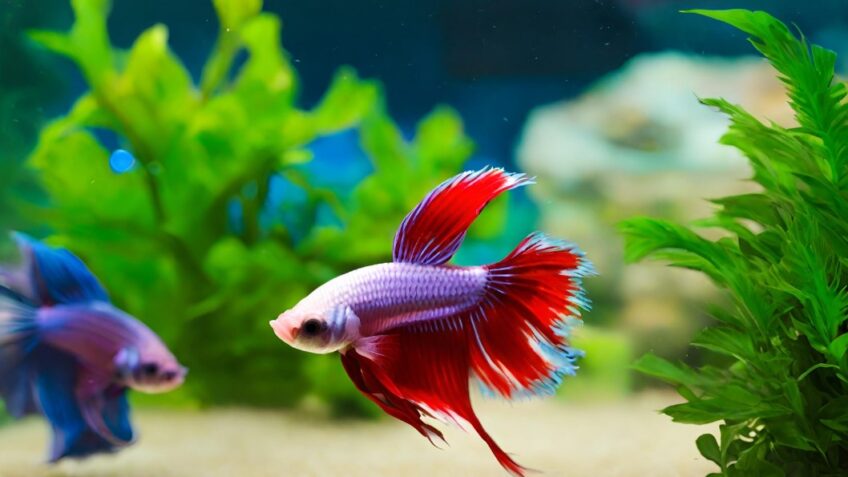Caring for a Betta fish is an enjoyable and rewarding experience filled with vibrant colors and captivating behaviors.
One question many Betta owners ask is about their resilience when it comes to feeding: How long can Betta fish go without food?
In this post, I will explore this question in detail, ensuring your Betta remains healthy and happy, even when life gets busy.
Key Takeaways
- Bettas can survive 10 to 14 days without food, but it’s not ideal due to stress and health risks.
- Preparing your Betta’s tank with clean water and a stable environment and using automatic feeders or pet sitters can ensure their well-being in your absence.
- Regular, small meals and a varied diet are crucial for maintaining a Betta’s health, especially when planning for times away.
Betta Fish and Their Needs
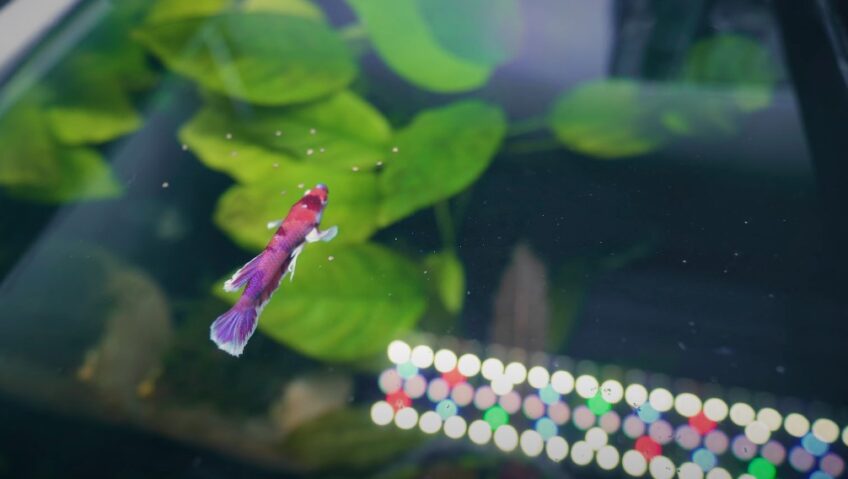
Betta fish, also known as Siamese fighting fish, are renowned for their striking colors and elaborate fins.
They’re a popular choice for both beginner and experienced aquarium enthusiasts. But even these hardy creatures have their limits, especially when it comes to food.
How Long Can They Really Last Without Food?
On average, Betta fish can survive without eating for about 10 to 14 days. It’s crucial, however, to understand that this is not ideal.
While Bettas are resilient, extended periods without food can stress them and leave them vulnerable to diseases, including eye disorders..
Factors Influencing Betta Survival Without Food
Several key factors play a role in how well a Betta can cope without food:
- Tank Size: Smaller tanks may have issues with water quality, affecting Betta health.
- Overall Health: A healthy Betta is more likely to withstand periods of fasting.
- Tank Filtration: Clean water is essential for Bettas, especially when not feeding regularly.
- Feeding Schedule: Regular, small meals are preferable to keep Bettas in optimal health.
Best Practices for Feeding Bettas
Ideally, Bettas should eat once every 12 hours, receiving small portions to prevent overfeeding.
Quality of diet is crucial, with a mix of pellets, frozen, or live food to ensure nutritional balance.
Preparing for Absence
Whether it’s a vacation or a busy schedule, there might be times when you can’t feed your Betta as usual.
Here are some strategies to ensure they remain well-cared for:
- Automatic Feeders: These devices can dispense food at set intervals, keeping your Betta fed in your absence.
- Pet Sitters: A reliable person can feed your Betta, offering the added benefit of checking on the aquarium’s overall health.
- Block Feeders: These slowly release food into the tank but should be used cautiously to avoid water quality issues.
Pre-Departure Tank Preparation
Before leaving your Betta, take steps to ensure their environment remains stable:
- Clean the tank and replace the filter to maintain water quality.
- Check the temperature and lighting to ensure a stable environment.
- Consider tank mates for additional stimulation, but ensure they are compatible with your Betta.
The Impact of Fasting on Bettas
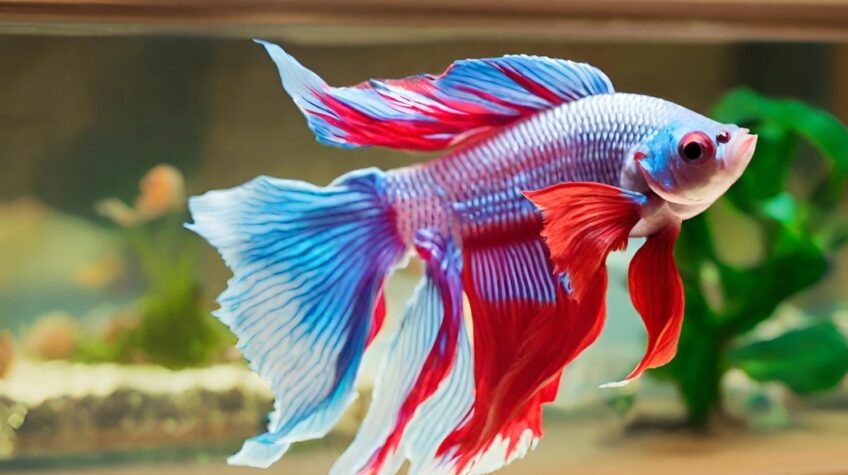
While Bettas can endure short periods without food, it’s not without consequences.
Fasting can help them process waste and prevent bloating, but the prolonged absence of food can lead to stress and health issues.
Regular feeding, coupled with a clean and stable environment, is key to a healthy Betta.
Health and Environment
- Clean Water: Perform partial water changes regularly, even if you’re using an automatic feeder.
- Stable Environment: Maintain a consistent day/night cycle and monitor temperature and water quality closely.
- Observation: Before any prolonged absence, ensure your Betta is healthy and free from signs of stress or disease.
Why Regular Check-Ups Matter
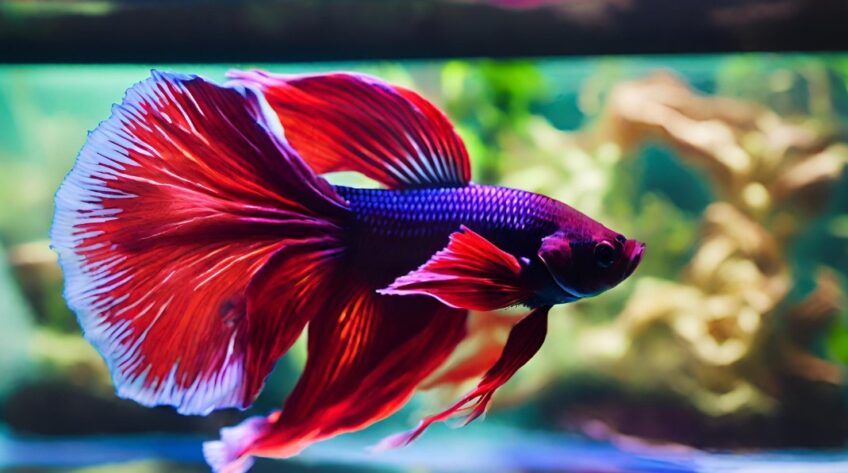
If you plan to be away for more than a few days, arranging for someone to check on your Betta periodically can be a lifesaver.
This ensures that, in addition to feeding, the fish’s environment remains healthy and stable.
Regular checks can help prevent issues that might arise from equipment failure or sudden changes in water quality.
Ensuring a Healthy Diet During Your Absence
Even with tools like automatic feeders, the quality of the diet shouldn’t be compromised.
Bettas thrive on a varied diet that includes high-quality pellets, as well as frozen or live foods such as brine shrimp or bloodworms.
Ensuring your feeding mechanism can handle this variety is essential for maintaining your Betta’s health and color vibrancy.
How to Choose the Right Feeding Strategy
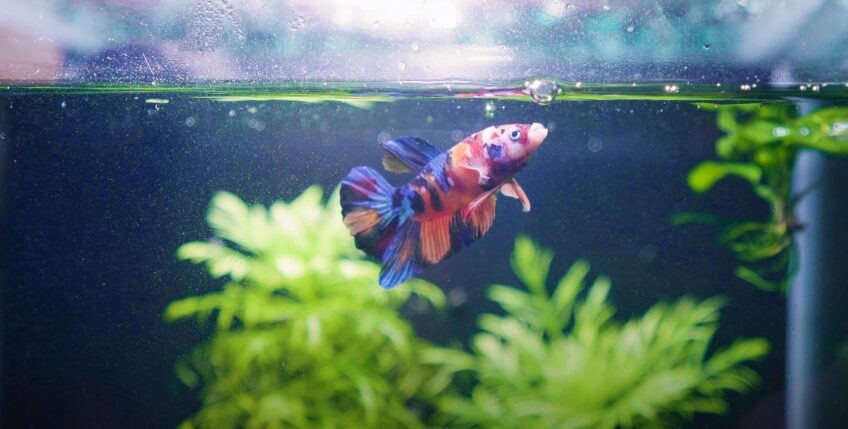
When deciding how to care for your Betta in your absence, consider the length of your absence and the reliability of the feeding methods available:
- Short-Term Solutions: For absences of a few days, automatic feeders or block feeders might suffice.
- Long-Term Care: For longer periods, a combination of an automatic feeder and regular checks by a pet sitter is advisable.
Common Concerns with Betta Care During Absences
Owners often worry about overfeeding and water quality. Here’s how to address these concerns:
- Avoid Overfeeding: Choose feeders that allow you to control portion sizes accurately.
- Monitor Water Quality: Even with feeding under control, water quality can deteriorate. Ensure your tank’s filtration system is up to the task, and consider a partial water change before leaving.
FAQs
Will my Betta get lonely if I leave for a week?
Bettas do not get lonely in the same way humans or some social animals do, but environmental enrichment is beneficial.
Can I leave my Betta alone for two weeks?
While Bettas can survive for up to two weeks without food, it’s not recommended due to the risk of stress and health issues.
If you must be away for this long, comprehensive preparation and regular check-ups are crucial.
What signs of stress should I look for in my Betta?
Signs of stress include clamped fins, fading colors, lethargy, and loss of appetite.
Ensure your Betta is healthy and stress-free before any planned absence.
Can Bettas eat plant roots in the absence of regular food?
No, Bettas are carnivorous and cannot sustain themselves on plant roots. They require protein-rich food.
Is it safe to leave the tank light on while I’m away?
It’s best to use a timer to maintain a normal day/night cycle, as constant light can stress your Betta.
Will my Betta eat algae as a food source when I’m gone?
Bettas do not typically eat algae, as they prefer a carnivorous diet. Algae won’t suffice for their nutritional needs.
Can cold water affect my Betta if I’m not there to monitor the temperature?
Yes, Bettas are tropical fish and require warm water. A sudden cold can stress them or lead to illness.
Do Bettas recognize when their owner is absent?
Bettas can notice changes in their environment and routine but don’t process owner absence as humans do.
Can I use a mirror to keep my Betta entertained while I’m away?
Mirrors should only be used sparingly, as prolonged exposure can stress Bettas by making them think there’s another fish.
Final Words
Caring for a Betta fish during absences requires planning and preparation.
Knowing their needs and setting up a reliable care system ensures that your Betta remains healthy and happy, even when you’re away.
Remember, the goal is to mimic their natural environment and dietary habits as closely as possible, ensuring a seamless transition during and after your absence.
With the right preparations, your Betta will continue to thrive, showcasing their beauty and resilience day after day.

